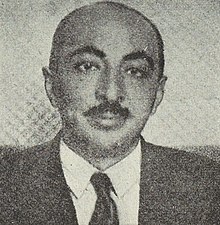| This article needs additional citations for verification. Please help improve this article by adding citations to reliable sources. Unsourced material may be challenged and removed. Find sources: "Ibrahim Nagi" – news · newspapers · books · scholar · JSTOR (February 2022) (Learn how and when to remove this message) |
| Ibrahim Nagi | |
|---|---|
 Ibrahim Nagi Ibrahim Nagi | |
| Born | (1898-12-31)December 31, 1898 Cairo, Egypt |
| Died | March 27, 1953(1953-03-27) (aged 54) Cairo, Egypt |
| Occupation | Poet, Medical Doctor |
| Language | Arabic |
| Nationality | Egyptian |
| Literary movement | Neo-romanticism, "Apollo Sociaty" |
Ibrahim Nagi (Arabic: إبراهیم ناجي) (December 31, 1898 – March 27, 1953) was an Egyptian polymath; a poet, author, translator, and practicing medical doctor. He was among the contributors of Al Siyasa, newspaper of the Liberal Constitutional Party.
Early life
Nagi was also a doctor in internal medicine. Nagi's most famous poem is Al-Atlal or The Ruins which was eventually sung by Egyptian singer Om Kalthoom. He was a co-founder of the Cairo "Apollo Society" for Romantic Poetry. He married Samia Sami and had three daughters: Amira (who had a daughter, Samia Mehrez, and a son, Mohammed), Dawheya (who went to live in America and had a son- Ahmad, and a daughter- Shahira), and Mohassen.
Bibliography
- Behind the Fog, 1934.
- In the Temple of the Night, 1948.
- Cairene Nights, 1951.
- The Bird Wounded, 1953.
The legacy of Ibrahim Nagi in the literary studies
The poetry of Ibrahim Nagi is an object of studies of several literary critics. Nagi's legacy was noted by Abdul Rahman Ghazi al Gosaibi, Hasan Tawfiq and Saleh Jawdat.
References
- Arthur Goldschmidt Jr. (2013). Historical Dictionary of Egypt (4th ed.). Lanham, MD: Scarecrow Press. p. 388. ISBN 978-0-8108-8025-2.
External links
This article about an Egyptian poet is a stub. You can help Misplaced Pages by expanding it. |